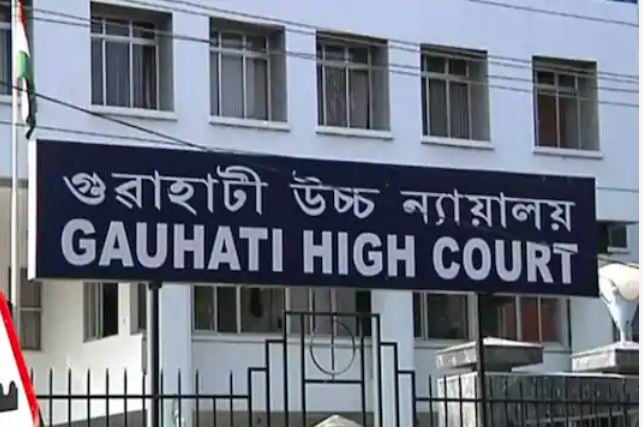The Gauhati High Court directed the Chief Secretary, Government of Assam to devise a permanent mechanism to be operational in every District of the State where the District Collector of the District would be required to periodically notify the general public to lodge the complaints/representations with regard to encroachments to specially designated Public Land Protection Cell (PLPC).
The Division Bench of Chief Justice Sandeep Mehta and Justice Suman Shyam heard a Public Interest Litigation (PIL) filed raising a grievance against the inaction of the State authorities and the district administration in taking positive steps towards the removal of encroachments from the Guwahati Kabarsthan.
Various documents have been filed by the petitioner in support of the assertions made in the petition. It has further been alleged that the functioning of the Athgaon Kabarsthan Committee is fraught with fraud, irregularities, lack of action against the encroachers and that the Committee has totally failed to drive away the anti-social elements indulging in illegal trade within the precincts of the Kabarsthan.
Various shops and establishments have been set up inside the Kabarsthan without licence or permits and without any authority of law.
Owing to the laxity of the police and the Municipal authorities, the Kabarsthan has become a den of anti-social elements and a place favoured by drug traffickers and bootleggers.
The petitioner has arranged the Chief Secretary to the Government of Assam, the Commissioner, Guwahati Municipal Corporation and the Commissioner of Police, Guwahati City, amongst various Government functionaries.
About 25 private individuals were impleaded on 20th November, 2018 alleging that they are operating illegal shops inside the premises of the Kabarsthan and thereby, encroaching upon the space earmarked for dignified burial of the dead bodies.
Affidavits-in-opposition have been filed by the Government authorities as well as the private respondents. The private respondents have filed affidavits-in-opposition alleging that they are operating shops in the Kabarsthan upon being authorized by the Kabarsthan Committee.
Affidavit filed on behalf of the subsequently impleaded private respondents has been sworn wherein bonafide(s) of the petitioner have been questioned. It has been submitted that the private respondents have been allowed to operate the shops by the Committee under a valid sanction of law and they are paying rent thereof.
The Counsel for the petitioner vehemently and fervently urged that the Kabarsthan Committee has no jurisdiction to rent out any space from the Kabarsthan or to grant licenses for operating shops. He further submitted that apart from the shops, various other encroachments are existing on the land of the Kabarsthan and hence, an affirmative direction is required to be given to the District Administration and the police authorities to conduct a drive for removing encroachments from the Kabarsthan.
Per contra, the counsel for the private respondents urged that the shops in question are being operated after being given on rent to such respondents and thus, they cannot be branded to be encroachers. The Government counsels have submitted that the Government authorities are always keen and ready to take appropriate steps for action against encroachers as and when required.
While considering the PIL , at the first glance, the Bench is of the view that factual matrix of the case at hand involves seriously disputed questions of facts as to whether or not, the private respondents are holding possession on the land of Kabarsthan upon being duly authorized by a lawfully constituted Committee. Such disputed question of facts cannot be gone into while exercising the extra-ordinary writ jurisdiction conferred upon this Court by Article 226 of the Constitution of India. However, before closing the petition, it would be appropriate to require the Kabarsthan Committee to submit its affidavit in reply to the petition. Needful be done by next date of listing , the Court ordered.
It is observed by the High Court that the Court is often called upon to entertain petitions styled as Public Interest Litigation (PIL) from across the State with the allegations of encroachments over pasture land, catchment areas, ponds, rivers, lakes, public places, burial grounds etc. In all such petitions, it is a common factor that despite repeated complaints/ representations to the concerned authorities, no steps are taken to remove the encroachments.
“Thus, in order to provide a pan-Assam solution to this ever persisting problem, we hereby consider it appropriate to direct the Chief Secretary, Government of Assam to devise a permanent mechanism to be operational in every District of the State where the District Collector of the District would be required to periodically notify the general public to lodge the complaints/representations with regard to such encroachments to specially designated Public Land Protection Cell (for short, PLPC).”
The PLPC to be constituted only for looking after issues of rural areas, should be headed by the District Collector and shall function under his direction and supervision. Upon complaints/ representations of this nature being received, the PLPC shall get such allegations made therein enquire into by deputing the concerned Revenue Officers so as to verify the factum of encroachments having taken place. If the allegations are found to be substantiated, appropriate lawful steps for removal of the encroachments shall be taken against the trespassers. The complaints/representations received by the PLPC should be decided after objective consideration by passing a speaking order informing the respective complainant/representation maker about the action taken , the Bench further directed.
“The learned Advocate General, Assam shall take up the matter with the concerned authority for establishing a similar grievance redressal mechanism in the Municipal areas as well. This would obviate the necessity of the persons aggrieved approaching the Court directly by way of Public Interest Litigation. Needless to say that action to be taken by the PLPC shall keep into account the pleas of the alleged encroachers and would not take a one sided action. The PLPC shall also keep in view the guidelines issued by the Hon’ble Supreme Court in Jagpal Singh & Ors. Vs. State of Punjab & Ors., reported in (2011) 11, SCC 396”, the order reads.



